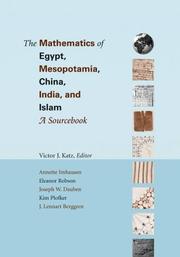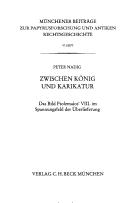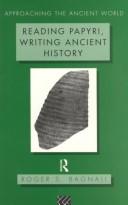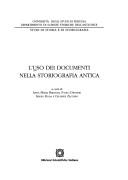| Listing 1 - 10 of 13 | << page >> |
Sort by
|

ISBN: 9780691114859 0691114854 Year: 2007 Publisher: Princeton: Princeton university press,
Abstract | Keywords | Export | Availability | Bookmark
 Loading...
Loading...Choose an application
- Reference Manager
- EndNote
- RefWorks (Direct export to RefWorks)
Mathematical logic --- Mathematics, Ancient --- Mathematics --- History --- Mathématiques --- --Antiquité --- --Histoire --- --Sources --- --History --- Mathematics, Ancient - Sources --- Mathematics - History - Sources --- Antiquité --- Histoire --- Sources

ISBN: 9783406559495 3406559492 Year: 2007 Volume: 97 Publisher: Munchen: Beck,
Abstract | Keywords | Export | Availability | Bookmark
 Loading...
Loading...Choose an application
- Reference Manager
- EndNote
- RefWorks (Direct export to RefWorks)
Law --- Sources. --- Ptolemy --- Ptolemaic dynasty, --- Ptolemaios --- Historiography. --- Political satire --- History. --- Egypt --- History --- Kings and rulers. --- Law - Egypt, Ancient - Sources.

ISBN: 0415093767 0415093775 9780415093774 Year: 1995 Publisher: London: Routledge,
Abstract | Keywords | Export | Availability | Bookmark
 Loading...
Loading...Choose an application
- Reference Manager
- EndNote
- RefWorks (Direct export to RefWorks)
History, Ancient --- Manuscripts (Papyri). --- Paleography. --- Historiography. --- Sources. --- Manuscripts (Papyri) --- Histoire ancienne --- Papyrus (Manuscrits) --- Historiography --- Sources --- Historiographie --- Handschriften (Papyri) --- Manuscrits (Papyrus) --- Papyri [Egyptian ] --- Paleography --- Handwriting --- Auxiliary sciences of history --- Writing --- Diplomatics --- Illumination of books and manuscripts --- Manuscripts --- Papyri, Egyptian --- Papyrus manuscripts --- Writing materials and instruments --- History [Ancient ] --- History, Ancient - Sources. --- History, Ancient - Historiography. --- History, Ancient - Sources
Book
ISSN: 00791687 ISBN: 9789004194229 9004194223 9789004194236 9004194231 1283120577 9786613120571 Year: 2011 Volume: 123 Publisher: Leiden: Brill,
Abstract | Keywords | Export | Availability | Bookmark
 Loading...
Loading...Choose an application
- Reference Manager
- EndNote
- RefWorks (Direct export to RefWorks)
Interest in Theophrastus, Aristotle's pupil and successor as head of the Peripatetic School, has increased considerably since the 1992 publication of Theophastus of Eresus: Sources for his Life, Works, Thought and Life . Now comes an extensive commentary on the ethical sources. It considers Theophrastus in relation to Aristotle, to other members of the Peripatos and to the Stoic philosophers who became Theophrastus' rivals. Special attention is given to Theophrastus' insistence that virtue by itself cannot guarantee happiness. Also to the difference between manners and moral virtue, the relation between innate character and fate, the value of marriage and how animal behavior relates to that of human beings.
Science, Ancient --- Philosophy, Ancient --- Philosophers --- Biography --- Sources --- Theophrastus --- Theophrastus. --- Scholars --- Ancient philosophy --- Greek philosophy --- Philosophy, Greek --- Philosophy, Roman --- Roman philosophy --- Ancient science --- Science, Primitive --- Science --- History --- Feofrast --- Theophrast --- Théophraste --- Theophrastos --- Teofrasto --- Theophrastus, --- Θεόφραστος --- Science, Ancient - Sources --- Philosophy, Ancient - Sources --- Philosophers - Greece - Biography - Sources
Book
ISBN: 9782251030043 2251030042 Year: 2008 Volume: 4 Publisher: Paris : Les belles lettres,
Abstract | Keywords | Export | Availability | Bookmark
 Loading...
Loading...Choose an application
- Reference Manager
- EndNote
- RefWorks (Direct export to RefWorks)
Education, Ancient --- Education, Greek --- Education --- History --- Education, Ancient - History --- Education, Ancient - Sources --- Education, Greek - History --- Education, Greek - Sources --- Education - Rome - History --- Education - Rome - Sources --- Éducation antique --- Enseignement --- Pédagogie --- Sources --- Antiquité --- Anthologies
Book
ISBN: 9780674428355 0674428358 Year: 2014 Volume: 65 Publisher: Washington: Center for Hellenic studies,
Abstract | Keywords | Export | Availability | Bookmark
 Loading...
Loading...Choose an application
- Reference Manager
- EndNote
- RefWorks (Direct export to RefWorks)
Christians talked, debated, and wrote dialogues in late antiquity and on throughout Byzantium. Some were philosophical, others more literary, theological, or Platonic; Aristotle also came into the picture as time went on. Sometimes the written works claim to be records of actual public debates, and we know that many such debates did take place and continued to do so. Dialoguing in Late Antiquity takes up a challenge laid down by recent scholars who argue that a wall of silence came down in the fifth century AD, after which Christians did not "dialogue."Averil Cameron now returns to questions raised in her book Christianity and the Rhetoric of Empire (1991), drawing on the large repertoire of surviving Christian dialogue texts from late antiquity to make a forceful case for their centrality in Greek literature from the second century and the Second Sophistic onward. At the same time, Dialoguing in Late Antiquity points forward to the long and neglected history of dialogue in Byzantium. Throughout this study, Cameron engages with current literary approaches and is a powerful advocate for the greater integration of Christian texts by literary scholars and historians alike.
History, Ancient --- Historiography. --- Sources. --- Rome --- Byzantine Empire --- History --- Dialogue. --- Debates and debating --- Christian philosophy --- History. --- Historiography --- History, Ancient - Historiography. --- History, Ancient - Sources --- Rome - History - Empire, 284-476 - Historiography. --- Byzantine Empire - History - To 527 - Historiography.

ISBN: 8849507763 9788849507768 Year: 2003 Volume: XII Publisher: Napoli: Ed. scientifiche italiane,
Abstract | Keywords | Export | Availability | Bookmark
 Loading...
Loading...Choose an application
- Reference Manager
- EndNote
- RefWorks (Direct export to RefWorks)
History, Ancient --- Historiography --- Histoire ancienne --- Historiographie --- Congresses. --- Sources --- Congrès --- Congrès --- Historical criticism --- History --- Authorship --- Ancient history --- Ancient world history --- World history --- Criticism --- History, Ancient - Historiography - Congresses --- History, Ancient - Sources - Congresses --- Historiography - Greece - Sources - Congresses --- Historiography - Rome - Sources - Congresses --- Historiography - Sources - Congresses --- Historiographie ancienne --- Diplomatique --- Histoire --- Méthodologie --- Antiquité
Book
ISBN: 8834317440 8834300920 9788834317440 9788834300923 Year: 1998 Volume: 12 Publisher: Milano: Vita e pensiero,
Abstract | Keywords | Export | Availability | Bookmark
 Loading...
Loading...Choose an application
- Reference Manager
- EndNote
- RefWorks (Direct export to RefWorks)
Manuscripts, Greek (Papyri) --- Papyrus grecs --- Translations into Italian --- Traductions italiennes --- Rome --- Kings and rulers --- History --- Sources --- Rois et souverains --- Histoire --- Manuscripts, Classical (Papyri) --- Classical literature --- History, Ancient --- Manuscripts --- Criticism, Textual --- Historiography --- Papyrologie --- -Classical literature --- -History, Ancient --- -Manuscripts, Classical (Papyri) --- Classical papyri --- Manuscripts (Papyri) --- Ancient history --- Ancient world history --- World history --- Literature, Classical --- Literature --- Literature, Ancient --- Greek literature --- Latin literature --- Papyrologie. --- Classical literature - Manuscripts --- Classical literature - Criticism, Textual --- History, Ancient - Historiography --- History, Ancient - Sources
Book
ISBN: 9780520253667 9780520253650 0520253655 0520253663 9786612359897 1282359894 0520944674 Year: 2009 Publisher: Berkeley (Calif.) : University of California,
Abstract | Keywords | Export | Availability | Bookmark
 Loading...
Loading...Choose an application
- Reference Manager
- EndNote
- RefWorks (Direct export to RefWorks)
The Economy of the Greek Cities offers readers a clear and concise overview of ancient Greek economies from the archaic to the Roman period. Léopold Migeotte approaches Greek economic activities from the perspective of the ancient sources, situating them within the context of the city-state (polis). He illuminates the ways citizens intervened in the economy and considers such important sectors as agriculture, craft industries, public works, and trade. Focusing on how the private and public spheres impinged on each other, this book provides a broad understanding of the political and economic changes affecting life in the Greek city-states over a thousand-year period.
Greece --- Grèce --- Economic conditions --- Conditions économiques --- Grèce --- Conditions économiques --- HISTORY / Ancient / General. --- History. --- Greece - Economic conditions - To 146 B.C. --- agriculture. --- ancient greece. --- ancient greek cities. --- ancient greek economics. --- ancient greek economies. --- ancient sources. --- archaic period. --- business. --- city state. --- classical studies. --- craft industries. --- cultural studies. --- diplomacy. --- early roman empire. --- economics. --- economy. --- greek city states. --- greek civilization. --- greek polis. --- history. --- money. --- polis. --- political. --- politics. --- private spheres. --- public spheres. --- public works. --- retrospective. --- roman period. --- trade. --- wealth.
Book
ISBN: 9783515104258 3515104259 9783515105743 Year: 2013 Volume: 45 Publisher: Stuttgart: Franz Steiner,
Abstract | Keywords | Export | Availability | Bookmark
 Loading...
Loading...Choose an application
- Reference Manager
- EndNote
- RefWorks (Direct export to RefWorks)
The concepts of memory and experience have stimulated interest in a wide range of recent cultural studies. In the history of scholarship on religion in Mediterranean antiquity, scholars have focused on the emotional dimension of both terms by employing the concepts of'Christianity'and its derivative,'oriental religion'. Only recently analyses in this field started focusing on interaction and individual experience. Research initiatives at Palermo and Erfurt have taken up this lead and brought together a group of scholars testing such approaches for new perspectives on the history of religion in the Greek and Roman world. This volume reviews the cognitive and emotional dimensions of such experiences in their diverse local, social, and ritual contexts. Memory likewise opens a window onto the interaction of individual and society. Contributions address the individual processes of memorialization and remembrance. They analyse the collective evocation of memories and their shaping of individual memory.
Civilization, Greco-Roman --- Civilisation gréco-romaine --- Greece --- Rome --- Grèce --- Religion --- Rome ancienne --- --Grèce ancienne --- --Religion --- --Histoire --- --Mémoire --- --Memory --- Mythology, Classical --- Classical antiquities --- Religious aspects --- Congresses --- Memory --- Civilization, Greco-Roman. --- Classical antiquities. --- Mythology, Classical. --- Religion. --- Religious aspects. --- Greece. --- Rome (Empire). --- Civilisation gréco-romaine --- Grèce --- Grèce ancienne --- Histoire --- Mémoire --- Memory - Religious aspects - Congresses --- Mythology, Classical - Congresses --- Civilization, Greco-Roman - Congresses --- Classical antiquities - Congresses --- Greece - Religion - Congresses --- Rome - Religion - Congresses --- Civilization --- History, Ancient -- Sources --- Reconciliation -- Biblical teaching
| Listing 1 - 10 of 13 | << page >> |
Sort by
|

 Search
Search Feedback
Feedback About UniCat
About UniCat  Help
Help News
News